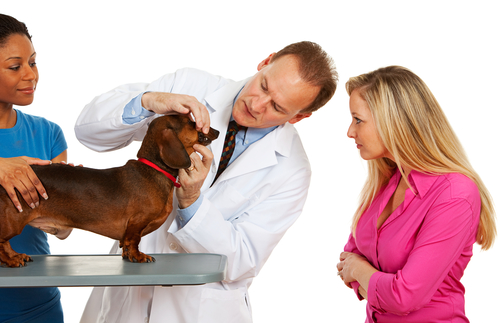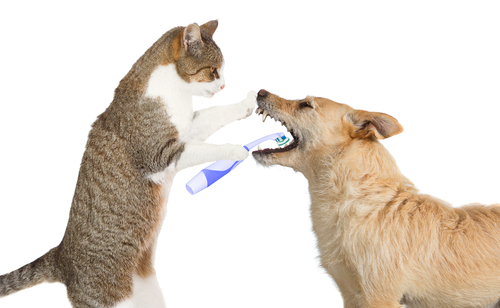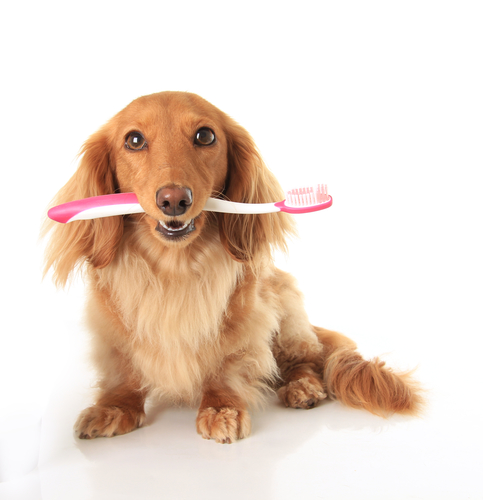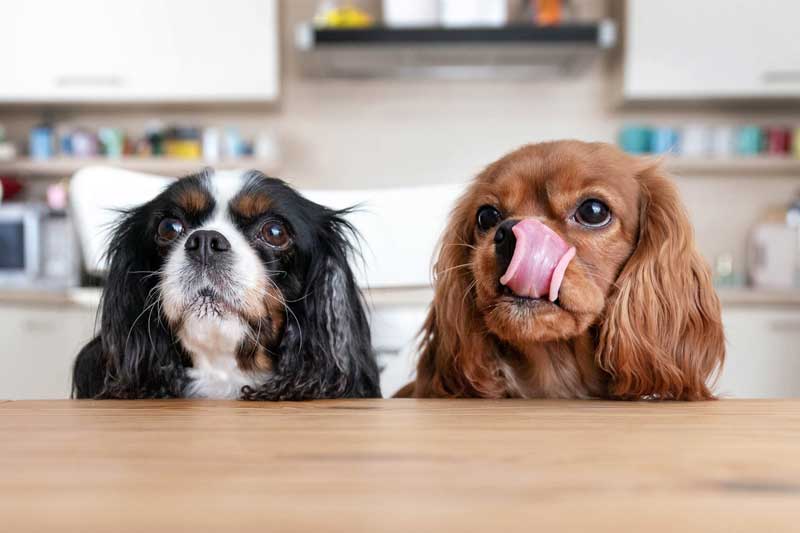Did you know that an estimated 80% of cats and dogs over the age of 3YEARS! have dental disease?
Most owners never take a look in their pet’s mouth and we don’t blame you, but we would love to! Most pets are reluctant to have your hand in their mouth and resent your efforts to have a good look. Would you know what you are looking for?
Many of our clients don`t understand that there is such a bad situation in some of their pet`s mouths because they still eat and chew with enthusiasm. The reason being is that they have no choice as they are “hard-wired” to eat! What choice do they have ?………….starve?
Dental hygiene is a very important part of your pet’s health care. At a young age, bacteria and saliva combine in your pet’s mouth and begin to form plaque on their teeth. Once plaque is established, calcium from saliva gets deposited in the plaque becoming calculus (or tartar) Tartar and plaque are massive populations of bacteria and these infect the gums creating gingivitis (gum inflammation). As the overall health of the oral cavity deteriorates a disease process known as periodontitis , (oral cavity disease that attacks the teeth, gums and bone), and means the whole mechanism which maintains the strong hold of teeth in the gums is weakened), and is responsible for eroded tooth roots, loose and painful teeth and root abscess.
Chronic ( long term) periodontal disease has devastating effects on a pet’s health. Along with grave discomfort and stinky mouth odour, toxins from the disease can be absorbed in to the bloodstream and infections can occur in major body organs such as the kidneys, liver and heart.
Here at Familypet Vet we want to help you learn what is going on in your pet`s mouth and understand why we are committed to stopping the vicious progression of gingivitis and periodontal disease. We are going to improve your pet`s life and consequentially your enjoyment of a close relationship with furry family.
Familypet Vet’s mission is ‘Happy Healthy Pets for life’

How do we do this?
We offer you an invitation to join our Dental Programme where we conduct a FREE dental check appointment every SIX months. One of your examinations will often be at your pet`s annual health check and vaccination and another SIX months later.
At this appointment an oral examination where your pet’s oral health is graded and a dental plan of action or maintenance is proposed that best suits you and your pet’s individual needs.

What does dental treatment involve if there is significant plaque, tartar or oral disease?
Unfortunately we cannot get your pet to sit in a chair and be patient while the Pet dentist does his job! We have to give your pet a short anaesthetic to clean and assess the oral cavity. It is only then that we can sometimes discover the full extent of oral health issues.

Because we want to ensure that your pet has no surprises with anaesthesia and recovery a blood test will be recommended prior to any treatment to check your pet’s kidney and liver function. If your pet is 7 years or older this is considered mandatory. REMEMBER! Each pet year is like 7 human years, so a 7 year old animal is like a 50 year old person. We all know health issues for us start appearing with greater frequency after the magic half century so we really want to make sure your pet is OK before we start.
If your pet requires a scale and polish they need to be asleep so they would need to stay with us for the day. We stain the teeth with a product which sticks to plaque and tartar which highlights the dirty spots. We seek out any defects in the attachment of the gingiva (gums) to the teeth which may indicate deeper disease and we may X-ray the pet`s teeth to confirm any suspicious areas or mark them to watch in the future. We clean after the staining with an ultrasonic scaler which is a fast way to effectively remove 95% of the plaque and tartar. The remaining 5% is removed with hand instruments and an oscillating polisher with slightly abrasive polishing paste with enzymes, to smooth the enamel surface of the teeth. Smooth teeth are then easier to keep clean for the start of a home care plan which targets the first stage plaque build up on teeth. The process of plaque build up commences almost immediately again so a programme of regular care with “brushing” and dental aids is really important and wherever possible, will be encouraged at all post treatment visits.
Just as your dentist uses dental x-rays to determine whether teeth extractions are necessary, veterinary dentists also get a lot of information about the state of health below the gum lines. If periodontal disease has damaged tooth attachments, or exposed the multiple roots of the bigger teeth, and caused changes to surrounding gum and bone, oral surgery ( extractions), may very likely be required.
By removing infected teeth, we remove the pain associated with the inflammation and infection of periodontal disease. All pets with teeth extracted are given pain relief before and whilst under the anaesthetic to ensure a comfortable recovery. With oral surgery for multiple or large teeth removals most are sent home with pain relief for the following days.
People are often concerned as to how their pets will eat their meals if they have had substantial teeth removals! ……………the answer is “ A lot better!”
From experience we can say that when we see the pets back for their post dental checks, we often hear comments from owners such as “He’s like a puppy again”, “A new dog”, “His breath is so much better!”
A dental procedure really can change their life……………………and yours too!
What can you do to change your pet’s life?
- Firstly book your pet in now for their FREE dental check. Let us set up a dental plan for your pet’s needs.
- Teeth Brushing
This is the golden standard of dental care you should aspire to provide for your pet. Brushing your pet’s teeth 3 times a week will dramatically enhance their oral hygiene.
NOTE - MUST use an animal toothpaste, NOT human, as human toothpaste is not effective in dogs and cats and the extreme frothing can cause distress and make future efforts of teeth cleaning very difficult due to the unpleasant experience previously encountered.
- Dental Diet
Premium brands such as Hills and Advance make a dental diet that helps reduce plaque build-up by chemical and mechanical actions. Come in today for your FREE sample of Hills prescription t/d biscuits.
- Treats and Chew Toys
Treats like Greenies are specifically designed to slow the progression of plaque build-up. Chew toys can also be beneficial and provide mental stimulation for your pets as well.
Raw bones are an option for some pets (not our preferred one), however discuss with your Vet first. Not all types of bones are recommended and can be dangerous if swallowed in chunks or if they get too much marrow. If dental disease is already present it might make things worse, or they just won`t be bothered or use the teeth that really need the help because they are so painful!
Here at Familypet Vet we are committed to working with you to ensure your furry family member lives a Happy, Healthy, pain free life.
Getting their dental hygiene up to scratch is a good place to start!
Take Action Today and Book Your FREE Dental Check
Call the clinic on (08) 8370 3500 for more information or to make an appointment.

